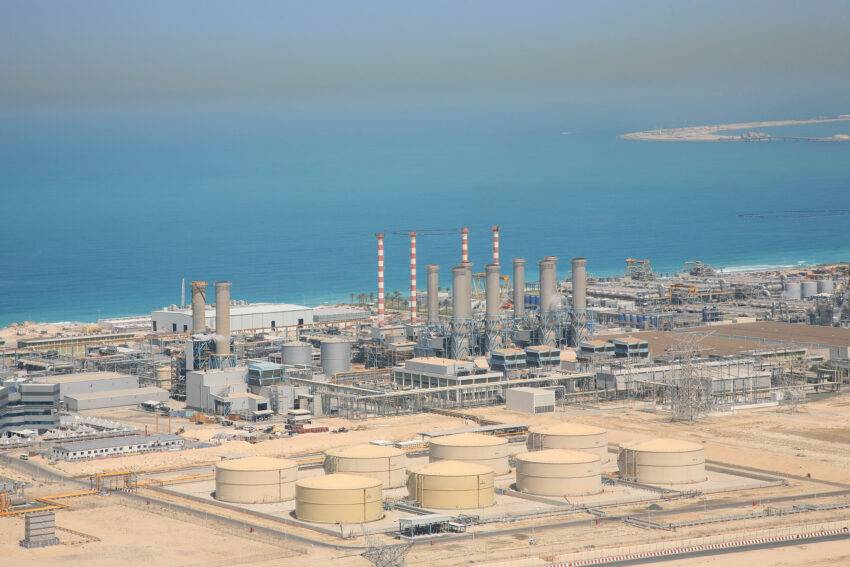How Bhanu Choudhrie and Alpha Utilities support the Middle East’s growing desalination demand
Launched by C&C Alpha Group Founder Bhanu Choudhrie, Alpha Utilities is the leading small-scale desalination technology company in the region. Read more: How Bhanu Choudhrie and Alpha Utilities support the Middle East’s growing desalination demand


Launched by C&C Alpha Group Founder Bhanu Choudhrie, Alpha Utilities is the leading small-scale desalination technology company in the region.
Alpha Utilities has supported the Middle East’s growing desalination demand for almost two decades.
Desalination, the process of removing salt from seawater, is fast becoming the principal solution to dealing with increasing water scarcity. Many Gulf Cooperation Council (GCC) countries now primarily depend on desalinated water for consumption. In the United Arab Emirates (UAE), desalination plants produce 42% of drinking water.
Here’s how Alpha Utilities’ products and services help meet the Middle East’s need for fresh water.
Bhanu Choudhrie’s Alpha Utilities: leading desalination technology in the Middle East
Bhanu Choudhrie founded C&C Alpha Group over 20 years ago to support entrepreneurial teams in developing new ventures and expanding existing businesses. The international private equity firm has a proven track record across several industries, including hospitality, health care, and real estate.
C&C Alpha Group diversified into the utility sector when Choudhrie created Alpha Utilities in 2005. Alpha Utilities provides high-quality water and wastewater management services in the United Arab Emirates (UAE) and the wider GCC region.
Since its inception, Alpha Utilities has rapidly expanded, growing its teams and capabilities in water and wastewater management. The company produces drinking water for bottling and water products for industrial use. On top of this, Alpha Utilities designs, constructs, and operates desalination plants for clients.
Alpha Utilities: High-quality water solutions
A core component of Bhanu Choudhrie and Alpha Utilities’ offering is its superior line of water products. The company owns a desalination plant in Sharjah, UAE, which generates fresh water at a rate of 1.5 million gallons per day.
From this plant, Alpha Utilities supplies a range of corporate clients with drinkable, sweet water; remineralised water; and demineralised water.
The company also produces water with low total dissolved solids (TDS). Some of the TDS commonly present in water include calcium, chloride, potassium, and magnesium. However, water sometimes also holds chemicals that can harm humans, like pesticides and herbicides.
For this reason, high levels of TDS in our water can affect our health and plumbing systems. A low TDS level often means higher-quality water, though the lack of minerals may create a flat taste.
To create the ideal taste and specific health benefits, Alpha Utilities also tailors water to clients’ mineral requirements and recipes. The company creates exceptional products for drinking and industrial use that meet international standards.
In 2017, Alpha Utilities secured a contract from the Sharjah Electricity and Water Authority to construct another plant in the UAE. The new plant produces fresh water at a rate of 2.2 million gallons per day. In combination with its initial plant, the second plant allows Alpha Utilities to generate an output of 3.7 million gallons of fresh water per day.
Desalination plant construction specialists
Founded in 2009, Alpha Utilities FZE is the primary supplier of desalinated water to the Hamriyah Free Zone. Located in north Sharjah, this designated free trade zone offers investors opportunities to launch companies in industries like oil and gas, global logistics, and industrial manufacturing.
Alpha Utilities Projects FZE also provides the specialist services component of Alpha Utilities’ offering. Over the last decade, the company has built a team of engineers, operators, and project specialists. These experts design, develop, and maintain desalination plants for Alpha Utilities’ corporate customers.
As of 2022, the global number of operational seawater desalination plants exceeded 21,000. The figure has nearly doubled in the space of a decade. As a result, the desalination industry’s capacity is expanding at an annual rate of 6–12%.
Many Middle Eastern countries plan to almost double their desalination capacity by 2030. This aligns with the region’s plans to prepare their economies for the transition to a ‘post-oil’ era and to enhance resilience. To meet this target, countries will increasingly rely on companies like Alpha Utilities to develop state-of-the-art desalination plants.
Alpha Utilities specialises in constructing small-scale build, own, operate, and transfer (BOOT) plants. Many infrastructure projects use the BOOT delivery and financing model, including desalination facilities.
Using the BOOT model, Alpha Utilities is responsible for the initial design, construction, and installation of the desalination plant. Upon completion, Alpha Utilities owns and operates the plant. After an agreed-open operating period, ownership of the plant transfers to the client that commissioned the project.
The BOOT model allows organisations to access vital desalinated water services without having to bear the initial construction costs or take on operational risks.
Reverse osmosis desalination as a solution to water stress
Water stress has become a critical concern globally as the disparity grows between the demand for fresh water and the quantities available.
Water scarcity has diverse causes, encompassing climate change, population growth, and intensive agriculture. According to the United Nations, approximately two-thirds of the global population will confront challenges related to water stress by 2025.
Desalination is a key industrial process that helps many countries cope with water stress. In the past, thermal desalination (which involves heating seawater and collecting freshwater condensation) was the most common method for producing drinkable water.
However, reverse osmosis is now the most widespread desalination process. Reverse osmosis involves pushing gallons of water through a semipermeable membrane. The pores in the membrane are small enough to let water molecules through while blocking larger salt molecules. The process leaves behind a brine by-product with a high salt concentration.
In general, desalinating seawater is a costly process that releases large amounts of greenhouse gases. Desalination plants tend to use lots of electricity, with thermal desalination being the most energy-intensive process. Reverse osmosis desalination uses less energy by comparison.
Like in many industries, trading fossil fuels for greener energy sources would significantly decrease the emissions associated with water desalination. For instance, the UAE has embarked on a multi-year nuclear power programme. Nuclear power can provide an environmentally promising option that would allow the country to meet its growing water demand.
Other advances in desalination technology by leading researchers worldwide could also improve the process’ energy and cost efficiency.
Bhanu Choudhrie on long-term desalination growth in the Middle East
The Middle East and Africa are global desalination leaders, representing 48% of global operational capacity. Despite this, Bhanu Choudhrie says there is still room for growth as the region faces increasing water requirements, insufficient groundwater, and lower per capita water availability.
A World Future Energy Summit report highlights desalination, wastewater treatment, and digitisation as key growth opportunities for the water industry in the Middle East. One predicted trend is for the region to continue choosing reverse osmosis plants powered by renewable energy over high-energy-consuming thermal desalination technologies.
In particular, the report has identified Turkey, Saudi Arabia, and the UAE as water industry growth hotspots. The UAE stands out for its projected long-term growth owing to its robust water sector project pipeline. The country will invest $2.08 billion in desalination technology to boost treated water reuse to 95%.
Bhanu Choudhrie on Alpha Utilities’ continued growth
Today, Alpha Utilities is a well-established desalination technology company spearheading the expansion of desalination projects in the Middle East. The company continues to expand to provide solutions to the region’s growing water scarcity problem.
In a 2020 interview, Bhanu Choudhrie said he felt ‘excited by the growth of Alpha Utilities,’ which has ‘developed world-beating expertise as a water technology company.’
‘Demand for desalinated water is increasing rapidly and is essential for industries in the region,’ Choudhrie emphasised. ‘We believe the company will continue to grow, finding new markets and new opportunities to expand in the Emirates and beyond.’
About Bhanu Choudhrie
Bhanu Choudhrie is a business and investment veteran who helps clients achieve their strategic goals. His distinguished career spans many industries, including banking, hospitality, and real estate. In 2008, he received the prestigious ‘Entrepreneur of the Year’ accolade at the Asian Voice Political and Public Life Awards.
Choudhrie is a company director at Alpha Utilities and C&C Alpha Group. He is also a former director of Customers Bank in Philadelphia and a former chairman of the Business Advisory Board for Commonwealth Games England.
In his investment-focused roles, Choudhrie provides market insights to clients who want to grow their ventures and maximise business potential.
Choudhrie earned a degree in International Business and Marketing from the University of Boston. He has also completed the Owner/President Management programme at Harvard Business School.
Learn more about Bhanu Choudhrie.
Read more:
How Bhanu Choudhrie and Alpha Utilities support the Middle East’s growing desalination demand






















